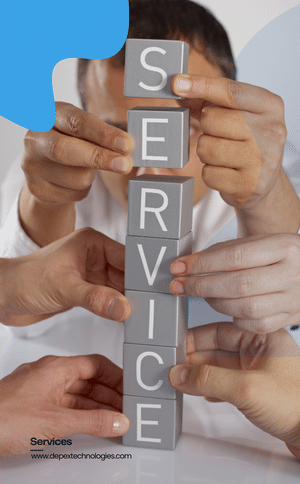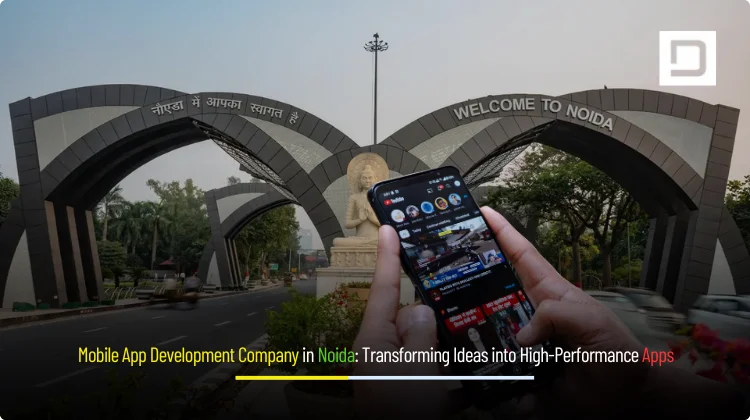Mobile App Development Company in Noida: Transforming Ideas into High-Performance Apps
In the rapidly evolving digital landscape, finding the right Mobile App Development Company in Noida has become crucial for businesses seeking to establish a strong mobile presence. As one of India’s leading technology hubs, Noida stands at the forefront of mobile innovation, hosting numerous companies that specialize in transforming innovative ideas into high-performance applications that drive business growth and enhance user experiences.
The mobile app development industry in Noida represents a thriving ecosystem where cutting-edge technology meets creative excellence. With the global mobile app market expected to reach $613 billion by 2025, businesses are increasingly recognizing the importance of partnering with the Best Mobile App Development Company in Noida to capitalize on this unprecedented growth opportunity.
The Mobile App Development Landscape in Noida
Noida has emerged as a prominent destination for mobile app development, attracting businesses from across the globe seeking cost-effective yet high-quality solutions. The city’s strategic location within the National Capital Region, combined with its robust IT infrastructure and skilled talent pool, makes it an ideal choice for companies looking to develop mobile applications that meet international standards.
The competitive landscape in Noida features numerous established players who have successfully delivered thousands of mobile applications across various industries. These companies leverage advanced technologies including artificial intelligence, machine learning, blockchain, and Internet of Things (IoT) to create sophisticated mobile solutions that address complex business challenges.
Current Mobile App Development Trends Shaping 2025
The mobile app development industry is experiencing significant transformation driven by emerging technologies and changing user expectations. Understanding these trends is essential for businesses planning their mobile app strategy.
AI-Powered Mobile Applications
Artificial Intelligence has become a mainstream tool in mobile app development, with AI-powered applications expected to surpass $126 billion in market value by 2025. Modern mobile apps integrate machine learning algorithms, predictive analytics, and natural language processing to deliver personalized user experiences. AI enables apps to learn from user behavior, provide intelligent recommendations, and automate complex tasks, making them more intuitive and efficient.
5G Technology Integration
The widespread adoption of 5G technology is revolutionizing mobile app capabilities, with over 1.5 billion users accessing 5G networks by 2023. This technology enables real-time features, cloud gaming, augmented reality streaming, and enhanced video conferencing capabilities. Apps can now handle more complex functionalities without compromising performance, opening new possibilities for innovative features.

Extended Reality and Immersive Experiences
Augmented Reality (AR) and Virtual Reality (VR) technologies are transforming how users interact with mobile applications. The global AR/VR market is projected to reach $97.76 billion by 2025, with applications spanning e-commerce, healthcare, education, and gaming. These technologies create immersive experiences that engage users in unprecedented ways.
Cross-Platform Development Evolution
Cross-platform development frameworks like Flutter, React Native, and Ionic have matured significantly, offering developers the ability to create high-performance apps that work seamlessly across multiple platforms. This approach reduces development time and costs while maintaining consistent user experiences across different devices.
Comprehensive Mobile App Development Services
Leading mobile app development companies in Noida offer a full spectrum of services designed to meet diverse business requirements. These services encompass the entire application lifecycle, from initial concept to post-launch maintenance and support.
Native App Development
Native application development remains the gold standard for performance-critical applications. Companies specializing in native development create platform-specific applications using Swift and Objective-C for iOS, and Java and Kotlin for Android. Native apps offer superior performance, seamless integration with device features, and optimal user experiences.
Native development typically requires separate codebases for each platform, resulting in higher initial costs ranging from $20,000 to $150,000 depending on complexity and features. However, the investment often justifies itself through enhanced performance, better user engagement, and access to platform-specific functionalities.
Cross-Platform Development
Cross-platform development has gained significant traction due to its cost-effectiveness and faster time-to-market. Using frameworks like React Native, Flutter, and Xamarin, developers can create applications that run on multiple platforms with a single codebase.
The cost advantage of cross-platform development is substantial, with projects typically costing 30% less than native development. A project that might cost $100,000 for native development could be completed for approximately $70,000 using cross-platform approaches. Development timelines are also significantly shorter, allowing businesses to launch their products faster.
Progressive Web App Development
Progressive Web Applications (PWAs) represent an innovative approach that combines the best features of web and mobile applications. PWAs offer native-like experiences while maintaining the accessibility and cost-effectiveness of web applications. They provide offline functionality, push notifications, and responsive design without requiring app store distribution.
Enterprise Mobile Solutions
Enterprise mobile applications require specialized expertise to address complex business requirements, security concerns, and integration challenges. Leading companies in Noida develop custom enterprise solutions that streamline business processes, enhance productivity, and improve employee engagement.
The Mobile App Development Process
Understanding the mobile app development lifecycle is crucial for businesses planning their app projects. Professional development companies follow structured methodologies to ensure project success and deliver high-quality applications.
1.Discovery and Strategic Planning
The development process begins with comprehensive research and strategic planning. This phase involves understanding the target audience, analyzing market conditions, studying competitor applications, and defining core functionalities. Developers conduct feasibility studies to assess technical requirements and establish project timelines.
Strategic planning also includes technology stack selection, platform prioritization, and budget allocation. Companies evaluate whether to pursue native, cross-platform, or hybrid development based on project requirements and constraints.
2.Design and User Experience
The design phase focuses on creating intuitive user interfaces and seamless user experiences. UX designers develop user journey maps, wireframes, and prototypes to visualize the application flow. UI designers then create visually appealing interfaces that align with brand guidelines and user expectations.
Modern app design emphasizes accessibility, inclusivity, and responsive design principles to ensure applications work effectively across different devices and user demographics. Motion design and micro-interactions enhance user engagement and create memorable experiences.
3.Development and Implementation
The development phase involves writing code, integrating APIs, and building both frontend and backend functionalities. Developers follow agile methodologies to ensure flexibility and continuous improvement throughout the project. Regular testing and quality assurance activities are integrated into the development process to identify and resolve issues early.
Modern development practices include automated testing, continuous integration, and deployment pipelines to ensure code quality and streamline the release process. Developers also implement security measures, performance optimizations, and scalability considerations during this phase.
4.Testing and Quality Assurance
Comprehensive testing is essential for delivering high-quality applications. Testing phases include functionality testing, usability testing, compatibility testing across different devices and operating systems, security testing, and performance testing. Beta testing with real users provides valuable feedback for final improvements.
Quality assurance teams use both automated testing tools and manual testing procedures to ensure applications meet specified requirements and perform reliably under various conditions. Load testing and stress testing verify that applications can handle expected user volumes and usage patterns.
5.Deployment and Launch
The deployment phase involves preparing applications for release on app stores and ensuring compliance with platform-specific guidelines. Companies handle app store optimization, metadata preparation, and submission processes. Post-launch activities include monitoring application performance, gathering user feedback, and planning future updates.
6.Ongoing Maintenance and Support
Mobile app development extends beyond the initial launch, requiring ongoing maintenance and support services. These services include security updates, performance optimizations, bug fixes, feature enhancements, and compatibility updates for new operating system versions. Annual maintenance costs typically range from 15-20% of the initial development investment.
Technology Stack and Expertise
Leading mobile app development companies in Noida maintain expertise across diverse technology stacks to address varied project requirements. Their technical capabilities span multiple programming languages, frameworks, databases, and cloud platforms.
Frontend Technologies
Frontend development expertise includes native languages like Swift, Objective-C, Java, and Kotlin, as well as cross-platform frameworks such as React Native, Flutter, Xamarin, and Ionic. Companies also utilize modern JavaScript frameworks, HTML5, and CSS3 for web-based mobile solutions.
Backend Technologies
Backend development capabilities encompass various programming languages including Python, Node.js, PHP, Java, and .NET. Companies integrate with cloud platforms like AWS, Google Cloud Platform, and Microsoft Azure to ensure scalability and reliability. Database expertise includes both SQL and NoSQL solutions such as MongoDB, PostgreSQL, and Firebase.
Emerging Technologies
Progressive companies stay current with emerging technologies including artificial intelligence, machine learning, blockchain, Internet of Things (IoT), and augmented reality. These technologies enable the development of innovative applications that provide competitive advantages and enhanced user experiences.

Industry Expertise and Specializations
Mobile app development companies in Noida serve diverse industries, each with unique requirements and challenges. This industry expertise enables companies to deliver specialized solutions that address sector-specific needs.
E-commerce and Retail
E-commerce applications require sophisticated features including product catalogs, shopping carts, payment gateways, inventory management, and personalized recommendations. Companies develop solutions that handle high transaction volumes, ensure security compliance, and provide seamless shopping experiences across multiple devices.
Healthcare and Telemedicine
Healthcare applications address critical requirements including patient data security, HIPAA compliance, telemedicine capabilities, and integration with medical devices. The COVID-19 pandemic has accelerated demand for remote patient monitoring and telehealth solutions.
Financial Technology
FinTech applications require robust security measures, regulatory compliance, and integration with banking systems. Companies develop mobile wallets, payment processing applications, and financial management tools that meet stringent security requirements.
Education Technology
Educational applications incorporate interactive learning features, progress tracking, multimedia content delivery, and assessment tools. The shift toward digital learning has increased demand for comprehensive educational platforms and mobile learning solutions.
Entertainment and Gaming
Gaming applications require specialized expertise in graphics optimization, real-time multiplayer functionality, and monetization strategies. Entertainment apps focus on content streaming, social features, and user engagement mechanisms.
Cost Factors and Investment Considerations
Understanding the factors that influence mobile app development costs helps businesses make informed investment decisions. Multiple variables affect project pricing, and companies should consider both initial development costs and long-term maintenance expenses.
Development Approach Impact
The choice between native and cross-platform development significantly affects project costs. Native development typically costs more due to the requirement for separate codebases and platform-specific expertise. Cross-platform development offers cost savings of approximately 30% while maintaining good performance for many applications.
Complexity and Feature Set
Application complexity directly correlates with development costs. Simple applications with basic functionality might cost $20,000 to $50,000, while complex applications with advanced features can exceed $250,000. Features requiring third-party integrations, custom animations, or specialized functionality increase development time and costs.
Design and User Experience Requirements
Custom design work, complex animations, and specialized user interface elements add to project costs. Companies that prioritize exceptional user experiences should budget appropriately for comprehensive design work and usability testing.
Geographic and Market Factors
Development costs vary significantly based on geographic location and local market conditions. Companies in Noida often provide competitive pricing while maintaining high quality standards, making the region attractive for cost-conscious businesses.
AI-First Search Optimization and Mobile Apps
As search behavior evolves toward AI-powered platforms, mobile applications must adapt their discoverability strategies. Traditional app store optimization (ASO) is being supplemented by AI-first search optimization techniques that improve visibility across various AI-powered platforms.
Understanding AI Search Evolution
AI-powered search engines like ChatGPT, Google AI Overviews, and Perplexity are changing how users discover applications and services. These platforms often provide direct answers without requiring users to click through to websites or app stores, creating new challenges for app marketing and discovery.
Optimizing for AI Discovery
Applications benefit from structured data implementation, comprehensive content optimization, and citation-worthy information architecture. Companies should ensure their apps and associated websites provide clear, factual information that AI systems can easily understand and reference.
Local SEO for Mobile Apps
Local search optimization remains crucial for mobile applications, especially as AI search engines prioritize geographically relevant results. Companies should optimize their Google Business Profile listings, maintain consistent business information across directories, and create location-specific content.
Content Strategy for AI Platforms
Successful AI-first optimization requires content strategies that focus on providing comprehensive answers to user questions. Applications and their supporting websites should include FAQ sections, detailed feature descriptions, and structured data markup to improve AI citation potential.
Measuring Success and Performance Optimization
Successful mobile applications require continuous monitoring, analysis, and optimization. Companies implement comprehensive analytics frameworks to track user behavior, application performance, and business metrics.
Key Performance Indicators
Essential metrics include user acquisition costs, retention rates, session duration, conversion rates, and lifetime value. Technical performance indicators encompass load times, crash rates, and user satisfaction scores.
User Feedback and Iteration
Successful applications incorporate user feedback into ongoing development cycles. Companies establish feedback collection mechanisms, analyze user reviews, and implement improvements based on user insights.
Performance Monitoring
Continuous performance monitoring ensures applications maintain optimal functionality across different devices and network conditions. Monitoring systems track server response times, database performance, and third-party service availability.
Security and Compliance Considerations
Mobile application security has become increasingly important as apps handle sensitive user data and business information. Professional development companies implement comprehensive security measures throughout the development lifecycle.
1.Data Protection and Privacy
Applications must comply with data protection regulations including GDPR, CCPA, and other regional privacy laws. Companies implement encryption, secure data transmission, and privacy-by-design principles to protect user information.
2.Authentication and Authorization
Robust authentication mechanisms including multi-factor authentication, biometric verification, and OAuth integration ensure only authorized users access sensitive features. Role-based access controls provide granular permission management for enterprise applications.
3.Secure Development Practices
Security-conscious development includes code review processes, vulnerability scanning, and penetration testing. Companies follow secure coding guidelines and implement security measures at both application and infrastructure levels.
4.Future-Proofing Mobile Applications
Successful mobile applications are designed with future scalability and technology evolution in mind. Companies that anticipate technological changes and user expectation evolution create more sustainable and competitive applications.
5.Scalability Planning
Applications should be architected to handle growing user bases, increased data volumes, and expanding feature sets. Cloud-native architectures and microservices approaches provide flexibility for future growth.
6.Technology Adaptation
Staying current with emerging technologies ensures applications remain competitive and relevant. Companies should evaluate new technologies and frameworks regularly to identify opportunities for enhancement and optimization.
7.User Experience Evolution
User expectations continue to evolve, driven by technological advances and changing behavioral patterns. Applications must adapt their interfaces, functionality, and interaction models to meet these changing expectations.
Choosing the Right Development Partner
Selecting the appropriate mobile app development company is crucial for project success. Businesses should evaluate potential partners based on multiple criteria including technical expertise, industry experience, portfolio quality, and project management capabilities.
Technical Expertise Assessment
Evaluate companies based on their technology stack proficiency, development methodology adoption, and ability to handle project complexity. Review portfolios to assess code quality, design standards, and technical innovation.
Industry Experience and References
Companies with relevant industry experience better understand sector-specific requirements and challenges. Request references from previous clients and review case studies to assess the company’s track record.
Project Management and Communication
Effective project management and clear communication are essential for successful collaborations. Evaluate companies’ project management methodologies, communication protocols, and reporting structures.
Post-Launch Support Capabilities
Long-term success requires ongoing support and maintenance services. Assess companies’ support offerings, response times, and commitment to long-term partnerships.
Conclusion: Partnering with Excellence
The mobile app development landscape in Noida offers exceptional opportunities for businesses seeking to transform their ideas into high-performance applications. With the right development partner, companies can leverage cutting-edge technologies, industry expertise, and cost-effective solutions to create mobile applications that drive business growth and user engagement.

Success in mobile app development requires more than just technical skills – it demands strategic thinking, user-centered design, and commitment to ongoing improvement. The Best Mobile App Development Company in Noida combines these elements with deep technical expertise and proven project management capabilities to deliver applications that exceed expectations.
For businesses ready to transform their innovative ideas into high-performance mobile applications, Depex Technologies stands ready to provide comprehensive development services that align with your vision and objectives. Our expertise spans the complete technology stack, from native and cross-platform development to emerging technologies like AI, blockchain, and IoT.
Depex Technologies not only delivers exceptional mobile applications tailored to your specific requirements but also ensures they perform optimally, engage users effectively, and grow with your business. Whether you need a startup MVP, enterprise-grade solution, or continuous upgrades, our team provides the expertise and dedication necessary for success.
For long-term projects, Depex Technologies also offers dedicated developers and dedicated teams for any technology, ensuring you have complete control and flexibility throughout your development journey. This approach provides businesses with skilled professionals who understand your specific requirements and can adapt to evolving project needs while maintaining consistent quality and timeline adherence.
Ready to bring your mobile app vision to life? Contact Depex Technologies today and discover how our comprehensive mobile app development services can transform your ideas into market-leading applications that drive business success and user satisfaction.






